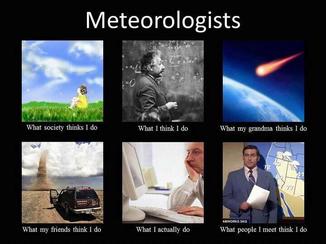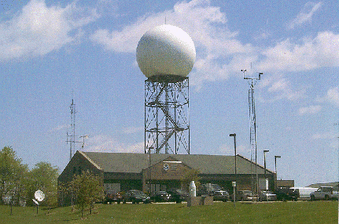
I read an article at The Vane weather blog called Do You Have What It Takes to Predict the Future? The Reality Behind Becoming a Meteorologist by Dennis Mersereau, and I thought it summed up the challenges of being a meteorologist very well. Below are some quotes from the article, with some of my commentary inserted.
Math and Physics
If you want to be a meteorologist, understand that by the time you graduate, you’ll also have a minor in physics and you’ll stand one or two courses away from double-majoring in math. Unless you channel your inner indigo child and figure out a better way to do it without numbers, meteorology is almost all math and physics. Whether you’re running complex computer models or calculating how much instability is available for thunderstorms to develop, everything in weather is math and physics. It’s a deeply technical science. You can’t escape it. The number one reason that meteorology students drop out of the major is because they can’t handle the math or physics.
You need to have a solid foundation in math and physics if you want to be a meteorologist. Don’t brush off high school algebra and trigonometry—the stuff you learn here is material you’ll have to recite by heart in higher-level courses. If you’re shaky on math and still want to pursue a career as a master prognosticator, seek out colleges with stellar math departments, or at least get ready to take advantage of tutoring programs in your spare time.
If you’re an aspiring meteorologist, don’t get scared off by the math and physics. It’s what helps you understand why the atmosphere does what it does. It’s hard, but many meteorology majors get through it with flying colors.
. @UGAAtmosSci students had thermodynamics test today. their review board. This is meteorology. luv this pic.twitter.com/whfxSmcvTK
— Marshall Shepherd (@DrShepherd2013) March 19, 2015
Forecasting
Weather forecasting is one of the only careers where you’re expected and able to predict the future with a scary level of accuracy. For example, across much of the United States, The Weather Channel’s forecasts are accurate something like 80% of the time, if not higher. Local news stations and National Weather Service offices also do a very good job at predicting weather for their jurisdictions. Accurately predicting what the atmosphere will do days before it happens is phenomenal when you think about it. This isn’t some Miss Cleo routine.
The forecasting process is a rigorous exercise of knowledge, experience, and the “art” of instinctively knowing what different weather features will do. Contrary to popular belief, models don’t forecast for you. Forecasting is very much a value-added process—reading a model verbatim and passing that off as your forecast will give you a wrong forecast every time.
A more accurate term for these computer programs is “model guidance”—the models are guiding you through the process of creating your own forecast. The latest runs of the GFS, NAM, and Euro models could all show three wildly different solutions. Your job is to figure out which ones are spitting out junk and which ones are closer to what will really happen, and working toward your forecast from there.
Oh, and not to mention the fact that if you’re wrong, people could die! But no pressure.
The forecast process can be a lot of fun, and it’s satisfying when you predict something that happens just as you expected. There are thousands of meteorologists out there, and if you ping any one of them on Twitter right now, they’ll shoot back that they’re having the time of their life in their dream jobs. Meteorologists love what they do. You should be excited to go to your major classes. This is what you’re going to do for the rest of your life.
Busted Egos
When you forecast the weather, as you will find through much of your life, you need to learn how to be wrong. A lot. And not only that, but you need to learn how to be wrong with grace and humility and harbor a sincere willingness to learn from your mistakes. Meteorology is a discipline that will shatter your ego and dance a jig of glee on its tiny remnants.
Even if you think you know a good bit about the weather, it’s always shocking to realize how little you really know once you start taking classes on the topic. There are so many unbelievably cocky, smug, know-it-all meteorology majors who walk into class on the first day like it’s a speed bump on their road to greatness, only to look like they ran through a meat grinder by the end of their first semester. You kind of have to be full of yourself to want to predict the future for the rest of your life, but you have to learn how to be full of yourself in a constructive manner. Be Kanye West with purpose instead of Kanye West for the sake of Kanye West.
The very nature of predicting the future means you’re going to be wrong, and sometimes when you screw up, you will go down in a spectacular ball of flames. “Live and learn” has to be your motto if you don’t want to find another line of work.
People
Meteorologists have to know how to deal with people. You will bust a forecast. People will get very angry with you. Quite honestly, people will get angry with you over nothing. You can predict a 100% chance of rain on Saturday afternoon, and you’ll get hate mail or angry phone calls because people will brush off your forecast and go about their outdoor plans anyway. Meteorologists in the media have gotten death threats when they call for snow in their forecast.
You’ll have to learn how to brush off the misdirected anger and accept constructive criticism when it’s valid. It’s hard to deal with people venting at you—especially if they make it personal—but people suck, and meteorology is a people business. If you scare off the people, your forecasts are useless blips in a vast expanse of nothing.
Jobs
It probably won’t come as a surprise that meteorology is a highly competitive field. Graduating with a degree in the field today is like attending a giant cake walk with hundreds of participants all vying to plant themselves in enough seats for a just few of them.
Don’t set your heart on getting a job with the National Weather Service or a media outlet. There are hundreds of private companies searching for meteorologists. Agriculture, aviation, energy, transport, shipping, space, engineering, and even tech companies all need meteorologists to achieve their various goals and keep their employees and operations safe.
Don’t think that all of meteorology is forecasting, either. There is always a need for engineers and technicians and developers who can invent and maintain new technologies to predict and detect the weather. For example, meteorologists are currently developing the next generation of weather radar called phased array, which will be light years better than what we have today.
Regardless of your career path, the most important skill a meteorologist (or weather geek) can possess is communication. You need to be able to tell your audience what’s going on and what they need to do to plan their actions. Your goal is to make people care about the weather even if they don’t. Your weather forecast is useless if you can’t effectively present it to your audience.

If you want to be a forecaster, then you have to be prepared to work all kinds of crazy hours. The weather never stops, and neither do the forecasters, so shift work and weekend work are part of the job. It will affect your social life and your family life. There can be moments of high stress (issuing a tornado warning when you know people in its path will die) as well as moments of boredom (stationary high pressure sitting overhead, or as we say, "big bubble, no trouble"). But I can't think of a job I'd rather do.
Weather Is Awesome
There aren’t many things on Earth more exciting than the weather. It never gets old listening to a deep crack of thunder that rumbles without end, or watching a hurricane swirl over the ocean in near-real-time thanks to a satellite orbiting thousands of miles above our heads, or even spotting the first snowflake of what could be the biggest blizzard in decades. There’s almost always something exciting going on with the weather, and no two events are ever the same.
Meteorology is an incredible field that people take for granted. They don’t appreciate the intense work that goes into this science until the fruits of that labor save their butt one day, and even then they don’t give it much thought. As the human population reproduces like bunnies and expands into areas we didn’t care about a few years ago, accurate weather forecasts and the development of new technologies to monitor hazards are more important than ever.
So many people have this mistaken idea that meteorology is standing out in a storm or pointing at cities on a green screen. That’s just the surface. You don’t see the hundreds of scientists who made it possible to choose that live shot location or predict the temperatures in those cities on the map. No reality show will ever be able to explain what goes into being a meteorologist. It’s not a field for everybody, but it’s one that provides a great reward if you’re up for the challenge of becoming America’s next great weatherperson.
If you're a weather fanatic but meteorology isn't the career for you, there are still ways you can get involved. You can become a Skywarn spotter, join the Community Collaborative Rain, Hail and Snow Network (CoCoRaHS), or become an official NWS Cooperative Observer.
If you have any questions about becoming a meteorologist, I'm happy to help. Just use the contact link at the top of the website, or contact me on Twitter at @Race4caster.





